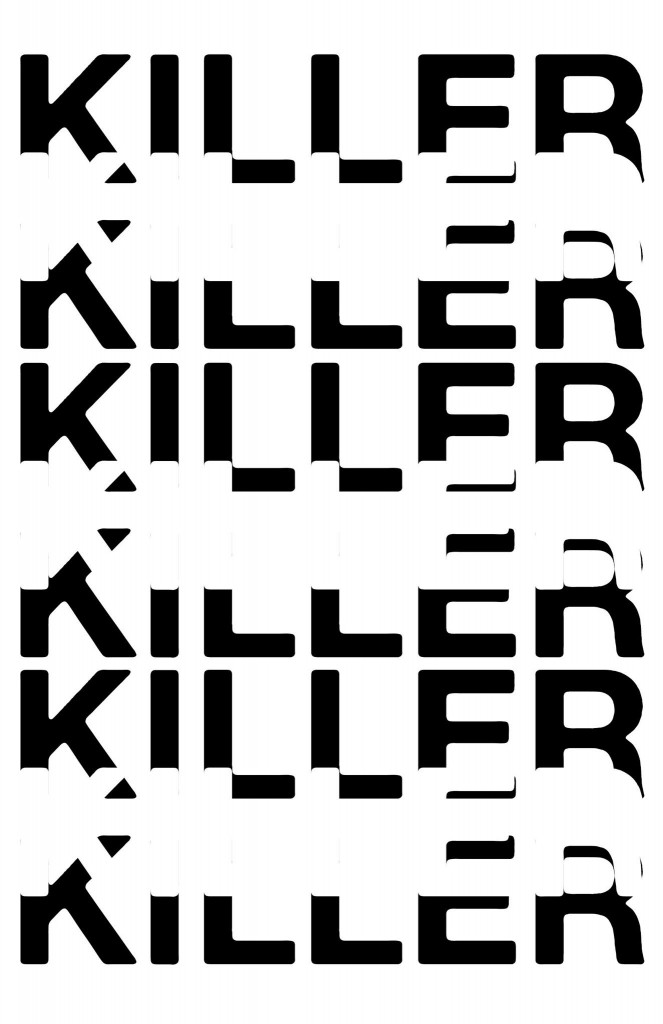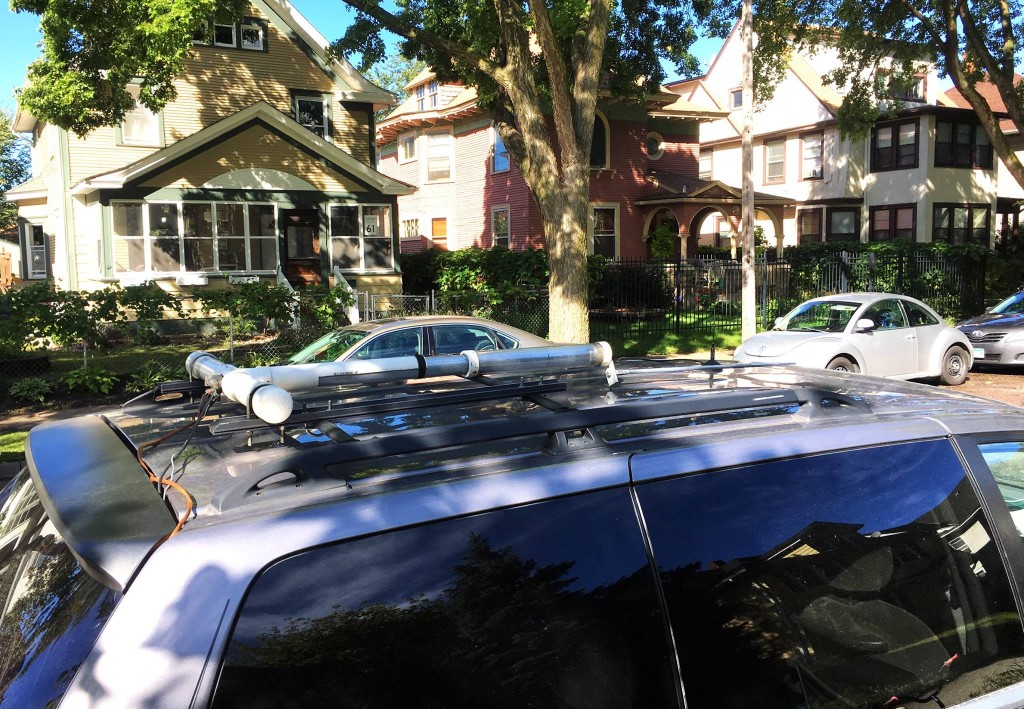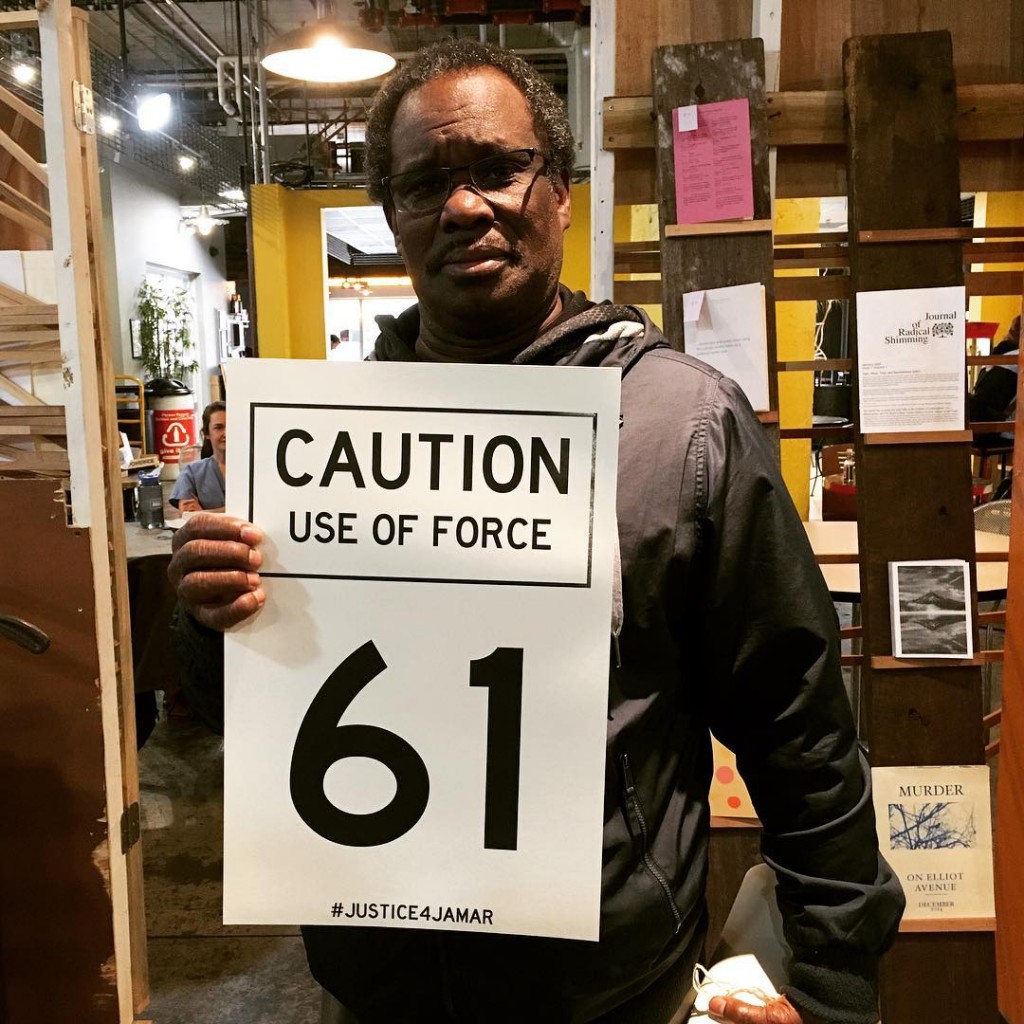
Many of us here in MPLS are a little shaken, but not at all surprised, after the verdict – not guilty on all counts – for Jeronimo Yanez, the St. Anthony, MN cop who murdered Philando Castile. How to move forward, how to act, how to relate and continue to coexist with one another here in a state that speaks so highly of itself, yet knows full well that it must come to terms with both its past and present and future wrong-doings. The first step, as always, is to begin to unpack the nature of it all: how we see it, how we feel it, how our attitudes become formed into our institutions.
Earlier today, frequent squatter at the shop (and dear friend and conversation partner), Marlon James wrote a piece about his experiences being the “big, black guy” here in Minneapolis. Please take a moment to read it in full, and consider how, while this post-verdict moment may feel singular, that moment accumulated becomes the totality of public life for black American men and women.
You can change a system, an institution, a standard of measure, but until you work to change yourself, this shit’s gonna keep going down, and the experiences and daily dread Marlon describes will never go away. Our institutions our us, they do not change on their own.

About a half-hour ago I was sitting here in Beyond Repair with Steven and had a bit of a shock. Who stepped into the Midtown Global Market, looking around, confused, not sure where to go? None other than MPD Police Federation President, Bob Kroll. He soon walked off, looking for something. Intrigued, I left Steven in the shop and walked around the market looking for Bob. Was he searching for us? If not, was he hungry? Where would he eat?
It seems though, while I was gone, Bobby found his way to the shop. He came in, saw a stack of Sgt. Kroll Goes to the Office, took about four or five, and avoiding any eye contact or interaction with Steven of any kind, quickly walked out.
I’ve been extremely happy, and frankly somewhat surprised, at the overwhelmingly positive reception this action has elicited. Both from the public at large, as well as elected officials in MPLS city government. Furthermore, it seems the action has been effective enough to get back to Lt. Kroll, and drive him across town to what he refers to in the comic as our “shit-hole neighborhood!” But hey, art will compel you into worlds that, prior to exposure, one would never dare to venture. I congratulate Lt. Kroll for, once again, braving the wilds of South MPLS.
All this said, I feel it is important for me to make this public; after the release of Sgt. Kroll Goes to the Office many people have urged me to publicly state the fact that Kroll, MPD, and their allies could retaliate in some way. Maybe, maybe not. But I agree that it is important to state that this possibility is, in fact, logical to consider and on my mind.
As an example, after the production of the comic was made public, but not yet released, the car in the above photo parked directly outside our home one afternoon. Having constructed low-wattage radio stations in the past I was interested, but also confused, by the DIY antenna apparatus on the roof of the vehicle. Something was off with its construction and orientation. I took a photo and sent it to a friend who is far more knowledgeable in that area than I am. He stated that, while not definitive, his guess was that it was a “cell phone sniffer.” What’s that? Well, myself and the small group who organized the visit to Mayor Hodges house last November, on the night the police were cracking down at the 4th Precinct Shutdown, are well aware of what it is. Area journalists, through a FOIA request, were able to find out as well. It’s a device that can read your text messages and listen in to your phone calls. It’s a tactic that MPD used that night and what allowed them to meet us at the Mayor’s house in advance of our arrival. And who knows, maybe it’s what is on top of the van outside our home in this photo. Or maybe not.
All of this sounds terribly psychotic and paranoid. But paranoia often arises out of social landscapes that speak towards something larger than each singular, seemingly fantastical, worry or suspicion. A kernel of truth exists in each.
So, if I start getting pulled over a lot; if we suddenly have numerous coding violations on our home; if, god forbid, DHS and MPD knock down our door over alleged child abuse accusations (which happened not long ago to a friend here in town who is critical of the police and their tactics; if I happen to be walking home and have the shit beat out of me, well, we all know who’s hand is at play. (Hi, Bobby!)
And this goes for ALL the artists involved in its production, and everyone else helping with its distribution as well.
I was sad to miss Bob when he visited the shop. I genuinely would have liked to have talked to him about his actions and ours. I called the Police Union a short while after we missed one another, but he wasn’t there. So I left a message on his voicemail inviting him to call me back to talk about the work. Maybe even have a book signing at the shop?
So Bob, it’s apparent that you are, in fact, paying attention to all this. I invite you to talk about it, but please don’t hit me – or accuse me of anything, or fuck with my kids, or listen into my phone calls or read my emails – let’s just talk.
I’ll be at Beyond Repair noon tomorrow. See you here. I’ll buy you a coffee.

This is Willie. He was here in the market to have lunch and noticed our poster focusing on how the MPD took 61 seconds to kill Jamar Clark from the moment they arrived to the point of the shooting. Willie took a handful of posters to distribute to friends and family. Come in and grab some too. Let’s keep up the pressure. #byemike #justice4jamar
Jeremiah Bey – frequent Beyond Repair friend / collaborator / etc – wrote the following within a post on Facebook today. How do we engage these attitudes, and their forms, which Jeremiah talks about? Not just on the local level, but cycled even further down, to the neighborhood? Many of us know that there are certain officers on the payroll within the 3rd Precinct known for abusive tactics. What more don’t we know? Past that, the very knowledge – passed from person to person – that these tactics exist within a neighborhood power structure (one with guns, other weapons, and impunity), how does that affect the psyche of a neighborhood? Terror exists in many forms and is utilized for many varied gains:
“Richard Zuley is not black, but he is a part of Black History. I will not consider this my Black History post of the day, but it’s something we should all know and understand.
Richard Zuley is the poster child for police corruption as an institutional problem. He was a Chicago PD homicide detective who created a department wide culture of torturing black and brown Chicagoans into murder confessions. When he retired from the CPD, he was invited to teach and facilitate his torture techniques at Guantanamo Bay.
Yes, his torture techniques were not only widely known about within the field of American law enforcement, they were admired. So much so, that the CIA wanted to learn from him.
Richard Zuley’s career didn’t come under scrutiny until after his retirement during a brutal “interrogation” of a Guantanamo detainee. The detainee, Mohamedou Ould Slahi, endured extensive abuse from Zuley, including a threat that Zuley would bring Slahi’s mother in to be raped by other inmates.
Zuley is also being accused of planting evidence on murder suspect, Lathierial Boyd, in 1990. During the arrest at Boyd’s expensive downtown loft, Zuley was heard telling him “no nigger is supposed to live like this”.
The Guardian wrote:
“Dick Zuley’s history as a military interrogator at Guantánamo and a police interrogator in Chicago scrambles that narrative. It suggests a continuum between police abuses in urban America and the wartime detention scandals that continue to do persistent damage to the international reputation of the United States.
Chicago, in particular, has its own deep and infamous history with police torture, with black Chicagoans its primary victims.”
Michelle Alexander encouraged us to begin connecting the dots. People like Richard Zuley not only connect dots, they sew entire seams together. My question is, just how many Richard Zuley’s are there? And if naming them could become an endless and futile game, then where should our energy be put to stop them?” – Jeremiah Bey